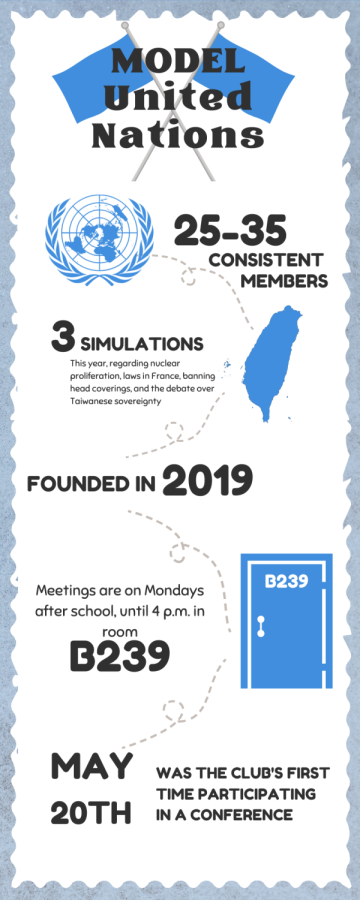Model UN competes for the first time
Photo credit: Maggie Dunn
June 7, 2023
In each meeting for the Model United Nations club, students learn to work together to find solutions to international issues that are relevant to society. The club began pre-pandemic, and was temporarily paused during quarantine. However, the club has returned with more members than before.
Model UN allows students to engage with international issues and provides a unique opportunity for students to explore how these topics might relate to possible careers, according to freshman Aine Mahoney.
“What I enjoy most about Model UN is the immersive learning about foreign affairs,” Mahoney said. “As well as the experience of being on different diplomatic committees has opened my eyes to potential careers for me.”
During each club meeting, a range of 25-35 members are given a topic about a world issue and cooperate to identify underlying issues, find possible routes of solution and solve the problem. This year, Model UN is being advised by social studies teacher Brent Maynard.
“Each student has a role in representing their country, but responsibilities can vary,” Maynard said. “Students can freely choose to speak in front of the entire delegation or write resolutions to possibly solve issues, but neither is required. They can more informally discuss the issues during what are called ‘unmoderated caucuses,’ where delegates can talk informally in groups or one on one to find allies and form plans.”
When the secretary of the club, senior Grace Korkmaz, and other leadership look for new members, they are not looking for students with years of experience, but instead anyone that feels passionate enough to join.
“No skills are needed when starting the club, as we are a very inclusive environment,” Korkmaz said. “[We] build every one of our members from the ground up on all conference expectations from the very beginning of the year.”
The club meets in room B329 every Monday from 3:15 p.m. to 4 p.m. While there are no actual requirements to join Model UN, Maynard believes that students can develop many skills.
“Skills needed are interpersonal, an interest in international issues and politics, public speaking, policy-writing writing, problem-solving, planning and organizing skills,” Maynard said.













